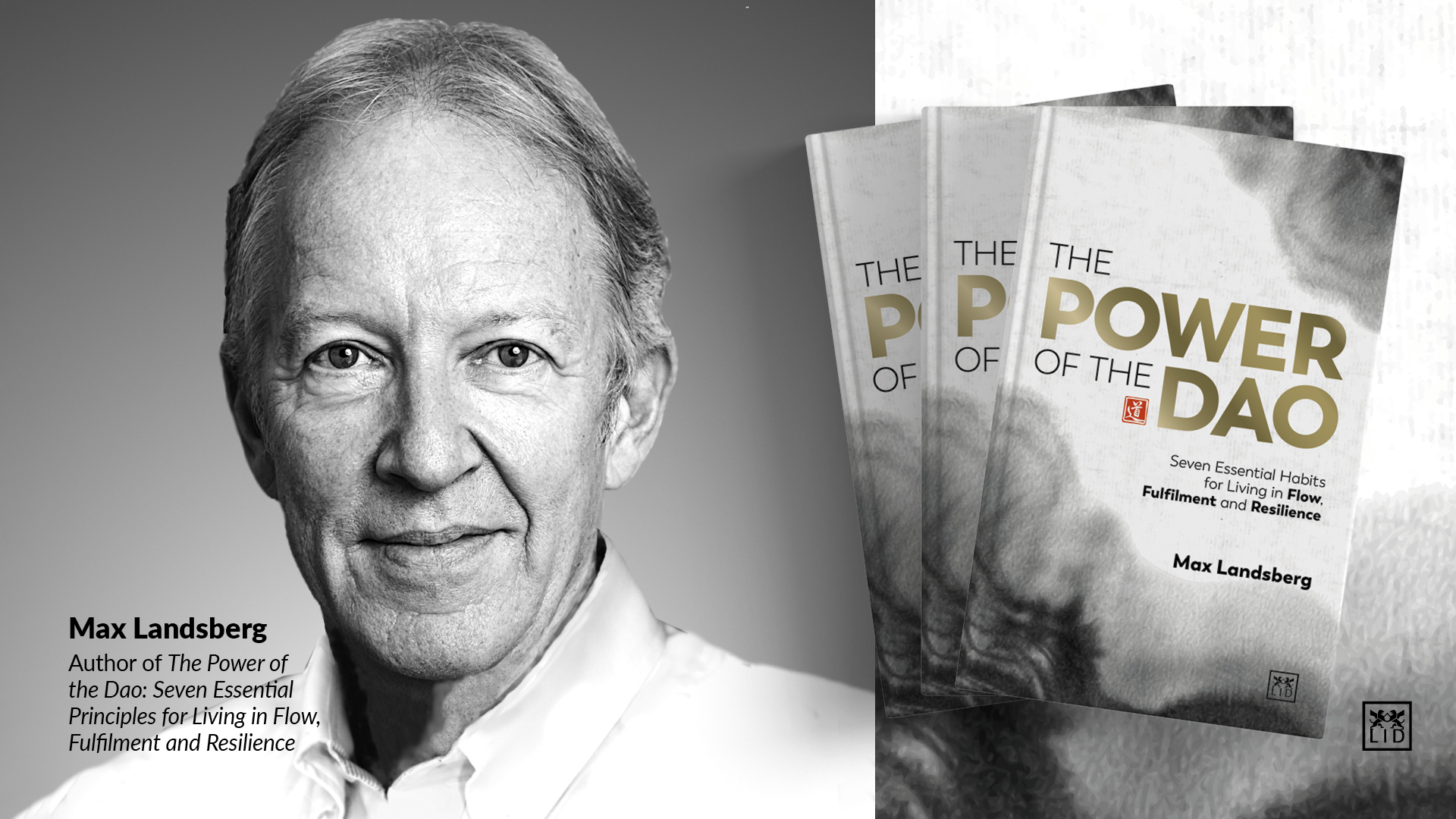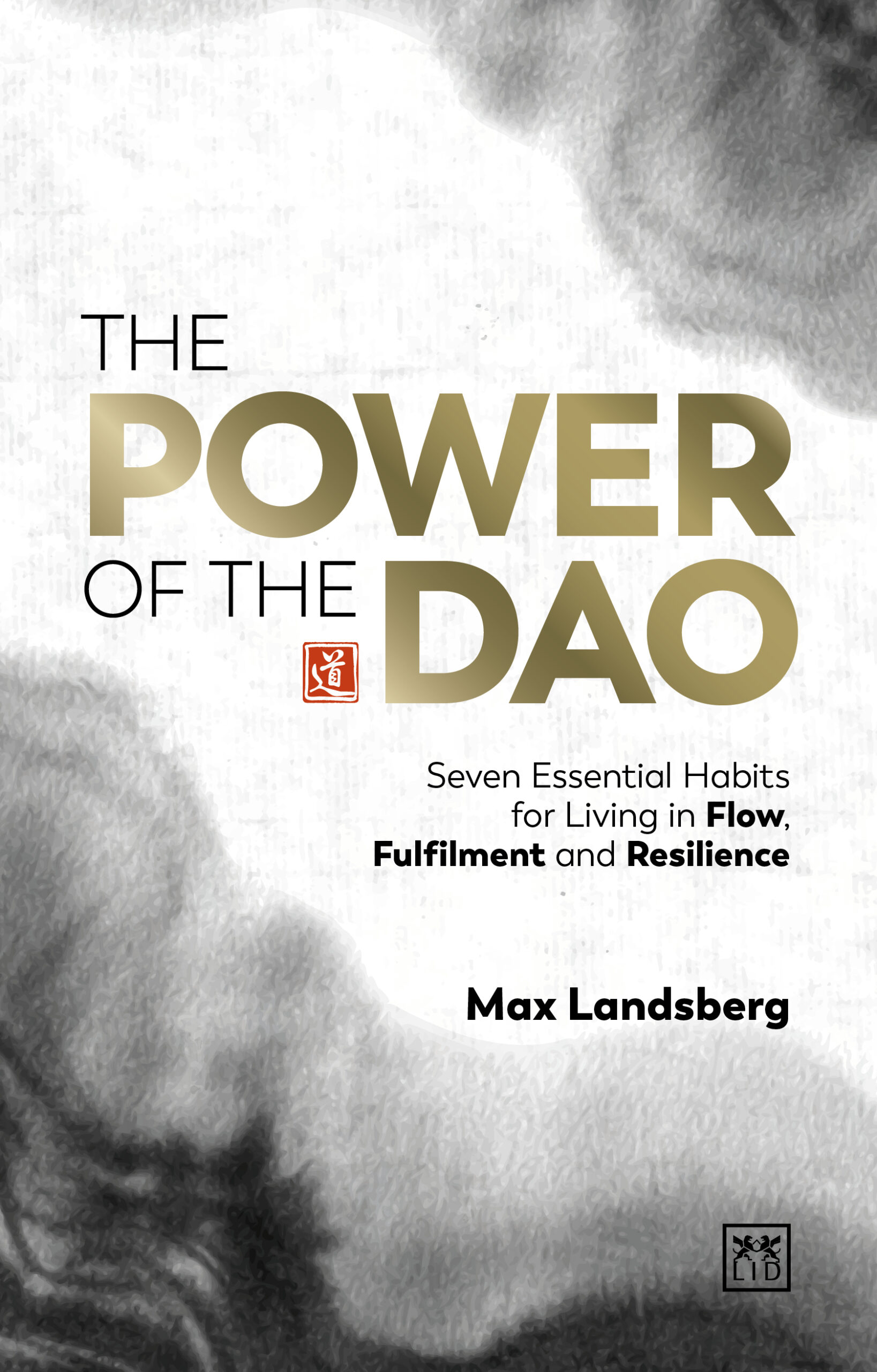|
How Daoism Can Inform Effective Leadership with Max Landsberg
How Daoism Can Inform Effective Leadership

By Guest Contributor Max Landsberg
Author of The Power of the Dao, Max Landsberg, reveals how Daoism can help leaders create a clear and compelling vision, inspire their team to follow it and maintain and increase their momentum.
Daoism is a philosophical yet practical tradition that originated in ancient China, and which emphasizes co—operating with the Dao: the natural order of things. Daoism offers valuable insights for leaders who want to create a clear and compelling vision, inspire their team to follow it and maintain and increase their momentum. The principles of Daoism can help a leader achieve these three outcomes, as illustrated below using examples from the Daoist texts and other sources.
In today’s world, enterprises are too complex to micro-manage, as eloquently foretold in the 1992 book Out of Control, by Wired’s founding editor, Kevin Kelly. And they are increasingly buffeted by the Unknown Unknowns quoted by Donald Rumsfeld, and the Black Swans of Nassim Talib’s theory. In this environment, the Daoist approach – with its emphasis on the dynamic, adaptive, and holistic – is particularly relevant.
Vision: Creating a Clear and Compelling Vision
A leader’s vision is the desired future state that they want to achieve with their team. A vision should be clear, meaning that it is specific and understandable, and compelling, meaning that it is attractive and motivating. A clear and compelling vision can guide the team’s actions, align the team’s efforts, and foster the team’s commitment.
Daoism can help a leader create a clear and compelling vision by aligning it with the Dao, the natural order of things. The Dao is the source and principle of everything that exists, and it is characterized by simplicity, spontaneity, and harmony. According to the Daoist text Daodejing, “The Dao that can be spoken is not the eternal Dao”, meaning that the Dao is beyond words and concepts. However, the Dao can be experienced and followed by observing and imitating nature. The Daodejing also says, “The sage models himself after the Dao”, meaning that the wise leader should act in accordance with the Dao.
By aligning their vision with the Dao, a leader can create a clear and compelling vision that reflects the reality and potential of their team and their environment. A vision that is based on the Dao is clear because it is simple and concise, avoiding unnecessary complexity and confusion. A vision that is based on the Dao is also compelling because it is spontaneous and harmonious, appealing to the natural instincts and interests of the team members. A leader who follows the Dao can create a vision that resonates with their team and inspires them to pursue it.
For example, one of the most influential leaders in Chinese history was Laozi, the legendary founder of Daoism. According to a legend, Laozi was a librarian at the royal court who decided to leave China after witnessing its corruption and decline. As he was leaving, he was asked by a border guard to write down his teachings for posterity. He then wrote the Daodejing, which became one of the most influential books in world history. Laozi’s vision was to restore China to its original state of simplicity and harmony by following the Dao. His vision was clear because it was based on his observation of nature and his understanding of the Dao. His vision was also compelling because it offered a way out of the chaos and suffering that plagued China at that time. Laozi’s vision inspired many people to follow his teachings and practice Daoism.
Inspiration: Inspiring the Team to Follow the Vision
A leader’s inspiration is the ability to influence their team to follow their vision. A leader should inspire their team by communicating their vision effectively, demonstrating their commitment to their vision, and empowering their team to achieve their vision. A leader who inspires their team can foster trust, loyalty, and enthusiasm among their team members.
Daoism can help a leader inspire their team by practicing wu wei, the art of effortless action. Wu wei means acting without forcing or striving, but rather following one’s natural inclinations and adapting to one’s circumstances. According to the Daodejing, “The sage does not act, yet nothing is left undone”, meaning that the wise leader achieves great results by acting in harmony with the Dao. The Daodejing also says, “The sage does not boast of his achievements; he achieves without claiming credit”, meaning that the wise leader does not seek recognition or reward for his actions, but rather lets his actions speak for themselves.
By practising wu wei, a leader can inspire their team to follow their vision by setting an example of excellence, humility, and integrity. A leader who practices wu wei acts with excellence because they are in tune with their strengths and weaknesses, as well as with the opportunities and threats in their environment. A leader who practices wu wei acts with humility because they do not impose their will or ego on others, but rather respect their autonomy and diversity. A leader who practices wu wei acts with integrity because they do not manipulate or deceive others, but rather trust them and cooperate with them.
For example, one of the most successful leaders in Chinese history was Zhuangzi, a philosopher who developed Daoism further after Laozi. Zhuangzi was known for his brilliant insights into human nature and reality, as well as for his witty stories and parables that illustrated his teachings. Zhuangzi’s vision was to free people from the constraints of conventional wisdom and social norms, and to help them realize their true nature and potential by following the Dao. He inspired many people to follow his vision by writing and teaching in a creative and humorous way, without imposing his views or seeking fame or fortune. Zhuangzi practiced wu wei by living a simple and natural life, enjoying the beauty and wonder of the world, and sharing his wisdom with those who were interested.
Momentum: Maintaining and Increasing the Momentum of the Team
Momentum is the speed and direction that the leader of a team generates, for progress toward the vision. An effective leader maintains and increases the momentum of their team by monitoring and evaluating their performance, providing feedback and recognition, and adjusting their strategies and tactics. A leader who sustains the momentum of their team can ensure that their team stays on track, overcomes obstacles, and achieves their goals.
Daoism can help a leader maintain and increase the momentum of their team by applying the concept of yin-yang, the balance of opposites. Yin-yang is the principle that everything in the universe is composed of two distinct but complementary forces that interact and transform each other. According to the Daodejing, “When people see some things as beautiful, other things become ugly. When people see some things as good, other things become bad”, meaning that everything is relative and interdependent. The Daodejing also says, “The sage embraces both yin and yang; he harmonizes both light and dark”, meaning that the wise leader recognizes and balances both aspects of reality.
By applying the concept of yin-yang, a leader can maintain and increase the momentum of their team by being flexible and adaptable, as well as by being resilient and optimistic. A leader who applies yin-yang is flexible and adaptable because they can adjust to changing situations and circumstances, taking advantage of opportunities and avoiding threats. A leader who applies yin-yang is also resilient and optimistic because they can cope with challenges and difficulties, learning from failures and celebrating successes. A leader who embraces yin-yang can keep their team moving forward with confidence and enthusiasm.
For example, one of the most remarkable leaders in Chinese history was Sun Tzu, a military strategist who wrote the classic treatise The Art of War. Sun Tzu’s vision was to win wars without fighting, or with minimal fighting, by using superior strategy, tactics, and intelligence. He maintained and increased the momentum of his army by applying the concept of yin-yang to his warfare methods. He used yin-yang to deceive and confuse his enemies, to attack their weaknesses and avoid their strengths, to adapt to different terrains and seasons, and to exploit different situations and opportunities. Sun Tzu also used yin-yang to motivate and inspire his soldiers, to balance discipline and reward, to foster unity and loyalty, and to cultivate courage and morale.
* * *
Daoism is a rich source of wisdom for leaders who want to create a clear and compelling vision, inspire their team to follow it, and maintain and increase their momentum. By aligning their vision with the Dao, practicing wu wei, and applying yin-yang, a leader can achieve these three outcomes effectively and efficiently. Daoism can help a leader become more harmonious with themselves, with their team, and with their environment.
For a deeper understanding, see The Power of the Dao: seven essential habits for living in flow, fulfilment and resilience by Max Landsberg, and the Daodejing by Laozi, especially chapters 1, 2, 25, 28, 37, and 77 as quoted above.
ABOUT THE AUTHOR
Suggested Reading
 The Power of the Dao shows you how to achieve а state of constant flow, based on the enduring (ancient Chinese) wisdom of Daoist principles and practice. Millions of people have lived a better, happier and more productive life by following all or some of these Daoist principles. The book provides the seven core principles of Daoism to help you live your live in productive yet relaxed flow for extended periods – or all the time.
The Power of the Dao shows you how to achieve а state of constant flow, based on the enduring (ancient Chinese) wisdom of Daoist principles and practice. Millions of people have lived a better, happier and more productive life by following all or some of these Daoist principles. The book provides the seven core principles of Daoism to help you live your live in productive yet relaxed flow for extended periods – or all the time.

